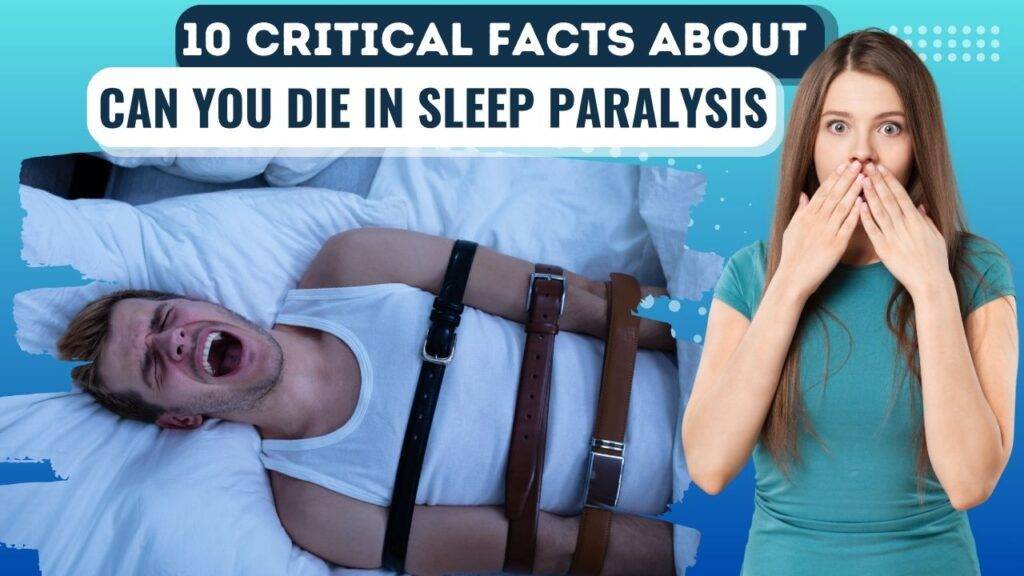
Discover the essential 10 facts about “Can You Die in Sleep Paralysis” in this comprehensive article. Learn about this intriguing phenomenon, its risks, and more.
Introduction
Sleep paralysis is a strange and often scary condition that makes many people wonder about the health risks and effects it might have. These are the ten most important facts you need to know about “Can You Die in Sleep Paralysis?”
This complete guide will give you all the details you need to understand this fascinating experience, bust some myths about it, and learn how it might affect your health in general.
Can you die in sleep paralysis?
Sleep paralysis is when you can’t move or speak for a short time. It usually happens right before or right after you wake up. During an episode, you might have strong hallucinations and feel like your chest is pressing down on you. It’s important to remember that sleep paralysis by itself is not fatal, even though it can be scary.
Understanding Sleep Paralysis
To better understand the phenomenon, let’s explore some key aspects:
- Frequency: Sleep paralysis can occur infrequently or frequently, varying from person to person.
- Duration: Episodes typically last for a few seconds to a couple of minutes.
- Trigger Factors: Stress, sleep deprivation, and irregular sleep patterns can trigger sleep paralysis.
You may also like: 10 Ways to Enhance Your Dreams with Meditation
10 Critical Facts About “Can You Die in Sleep Paralysis”
In this section, we will cover ten crucial facts about sleep paralysis to dispel misconceptions and provide valuable insights.
Fact 1: Sleep Paralysis is Not Fatal
One very important thing to know is that sleep paralysis does not pose a threat to your life. Experiences like these can be scary, but they don’t kill you.
Fact 2: Breathing and Heart Function

Your heart and breathing will still work during a sleep paralysis episode. Your muscles stop moving, putting your body into a state called muscle atonia. However, your vital functions keep going as usual.
Fact 3: Vivid Hallucinations
People who have sleep paralysis often have vivid hallucinations that can be scary. These hallucinations are made up by your mind and have nothing to do with any conditions that could kill you.
Fact 4: The Fear of Death
Because sleep paralysis is so strange, a lot of people worry that they might die during it. Being aware that it’s only temporary and won’t kill you can ease your worries, though.
Fact 5: Sleep Paralysis as a Sleep Disorder
There is a sleep disorder called sleep paralysis, and it is often linked to other sleep disorders like narcolepsy.
Fact 6: Sleep Paralysis Triggers
Finding out what causes your sleep paralysis can help you control how often it happens. Stress, troubled sleep schedules, and a history of sleep disorders are all common triggers.
Fact 7: Treatment Options

If someone has frequent and upsetting episodes of sleep paralysis, they should get professional help. Some possible treatments are better sleep hygiene, learning how to deal with stress, and taking medicine.
Fact 8: Sleep Paralysis Prevalence
There are more people who get sleep paralysis than you might think. A big part of the population will experience it at least once in their life.
You may also like: 10 Most Common Problems of Newborn Babies Every Mother Should Know
Fact 9: Cultural Interpretations
Different cultures have different ideas and beliefs about what sleep paralysis is. Some cultures connect it to ghosts or other supernatural things, while others see it as a health problem.
Fact 10: Better Sleep Practices
Getting better sleep overall by sticking to a regular sleep schedule, making your bedroom more comfortable, and dealing with stress can help you have fewer sleep paralysis episodes.
Conclusion
To deal with this interesting condition, you need to know about sleep paralysis and how it affects your health. This article’s 10 facts about sleep paralysis are meant to bust some myths and give you useful information. Remember that even though it may be upsetting, it is not dangerous to your life. You can have fewer episodes of sleep paralysis and a better night’s sleep by dealing with your triggers and improving the way you sleep.
Few More Queries
- Is sleep paralysis dangerous?
No, sleep paralysis is not dangerous in itself. It can be distressing, but it does not pose a risk to your life.
- Can you control sleep paralysis?
Controlling sleep paralysis during an episode can be challenging, but you can manage and reduce its frequency by addressing underlying triggers like stress and sleep patterns.
- Is sleep paralysis linked to other health issues?
Sleep paralysis can be associated with other sleep disorders, such as narcolepsy, but it is not inherently linked to severe health issues.



